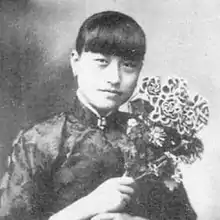Chen Jieru
Chen Jieru (Chinese: 陳潔如; pinyin: Chén Jiérú; Wade-Giles: Ch'en Chieh-ju; 26 August 1906 – 21 January 1971) was the second wife of Chiang Kai-shek. She was nicknamed Jennie.[1]
Chen Jieru | |
|---|---|
陳潔如 | |
 | |
| Born | 26 August 1906 |
| Died | 21 January 1971 (aged 64) |
| Resting place | Fushou Park, Qingpu, Shanghai 31°06′32.7″N 121°07′46.6″E |
| Nationality | Republic of China |
| Political party | Kuomintang |
| Spouse(s) | Chiang Kai-shek (m. 1921-1927) |
| Children | Chiang Yao-kuang (adopted) |
Chen's ancestral hometown was Ningbo, Zhejiang Province, and she was born in Shanghai. She wrote a memoir which Chiang successfully suppressed during his lifetime.[2][3]
It was finally published in 1993.[4] In the memoir, Chen details how she and Chiang Kai-shek met at the home of a mutual friend in 1918 and how he pursued her, finally convincing her to marry him on 5 December 1921 by stating that his arranged marriage with Mao Fumei was unhappy and celibate, and his liaison with Yao Yecheng was a social courtesy following her disfigurement.[4] The couple held their wedding at East Hotel in Shanghai.[5]
On their wedding night, Chiang infected Chen with syphilis, the treatment for which left her infertile.[6] Due to this, she adopted Chiang Yao-kuang.[7]
Chiang promised Chen that he was marrying Soong Meiling ( "Madame Chiang") for political convenience before a Buddhist shrine, saying "Should I break my promise and fail to take her back, may the Great Buddha smite me and my Nanjing government.", and arranged for her to go to the United States on a five-year "study tour"; after this she was meant to return and married life would resume. However, once there, Chen learned from press articles that Chiang denied their marriage and said that he had paid for a "concubine" to move to the United States, which deeply aggrieved Chen.[8]
Death
Chen died on 21 January 1971 in British Hong Kong. In 2002, she was moved to Shanghai by her sole heir, fulfilling her last wish to be returned to her native place, making her the first in Chiang Kai-shek's family to be buried in Mainland China after the end of Chinese Civil War in 1949. She was then laid at Fushou Park in Qingpu District, Shanghai.[9][10]
References
- Chang, Laurence. The Zhangs from Nanxun: A One Hundred and Fifty Year Chronicle of a Chinese Family. CF Press, 2010. ISBN 0692008454, 9780692008454. p. 199.
- 《人物:红颜命薄--做了七年蒋介石夫人的陈洁如(图)》,摘自赵宏著《蒋介石家族的女人们》,news.sina.com.cn轉載。
- "Review: Chiang Kai-shek's Secret Past: The Memoir of His Second Wife, Ch'en Chieh-ju. Edited and with an introduction by Lloyd E. Eastman. [Boulder: Westview Press, 1993. 273 pp. £20.95. ISBN 0-8133-1824-6.]". China Quarterly. Cambridge University Journals. 140: 1162–1163. December 1994. doi:10.1017/S0305741000053091. Retrieved November 10, 2014.
- Ch'en, Chieh-ju; Lee, James (1993). Eastman, Lloyd E. (ed.). Chiang Kai-shek's Secret Past: The Memoir of His Second Wife, Ch'en Chieh-ju. Boulder, Colorado: Westview Press. ISBN 0-8133-1824-6. Retrieved November 10, 2014.
- "The first lady hiding in the Republic of China hid many secrets of Jiang Jieshi". www.bestchinanews.com. Retrieved 2018-11-23.
- Ryan, Tom (2016). Purnell, Ingrid; Plozza, Shivaun (eds.). China Rising: The Revolutionary Experience. Collingwood: History Teachers' Association of Victoria. p. 79. ISBN 9781875585083.
- Li, Laura Tyson (2007). Madame Chiang Kai-shek: China's Eternal First Lady. Grove/Atlantic, Inc. ISBN 9780802198730.
- Ryan, Tom (2016). Purnell, Ingrid; Plozza, Shivaun (eds.). China Rising: The Revolutionary Experience. Collingwood: History Teachers' Association of Victoria. p. 79. ISBN 9781875585083.
- http://museum.fsygroup.com/index_en.php?c=grand&m=person&id=52
- http://museum.fsygroup.com/index_en.php?c=review&m=show&id=13